Sherlock Holmes and the Seven Deadly Sins Murders Read online
Sherlock Holmes
and the Seven Deadly Sins Murders
Barry Day
MYSTERIOUSPRESS.COM
For LYNNE and SONNY
… who both see and observe
Chapter One
“Deuced fine looking woman, Holmes. Table by the window. Sitting with the dark fellow. Don’t look now—she’ll notice …”
“My dear Watson, if you don’t think she’s observed your interest from the moment we sat down, I shall have to revise my opinion of you drastically. I’ve always hailed your reputation with the fair sex in—what was it?—three continents … three and a half, if we are to count the sub-continent of India. But really, my dear chap, when a man sits peering covertly into the mirror and stroking his moustache every other second, what is a lady—or indeed, anyone else—to think? He is either excessively narcissistic or he is preening for the benefit of the female of the species. And since I have observed no other woman under the age of sixty in this dining room, I think it only fair to deduce that she has assumed herself to be the object of your admiration.”
“So you have noticed her?” I detected a tiny note of triumph in my voice. I had occasionally noticed in the past that Holmes was not entirely immune to the charms of the fairer sex, even though he was inclined to view them as exhibits in some art gallery.
“It would be perverse not to, my dear fellow, since she does indeed stand out from the somewhat windblown local flora of this benighted spot to which you have insisted on dragging me.
“But now that you insist on engaging my attention in this way, when I was perfectly happy enjoying this rather fine grouse, tell me—what do you deduce about her?”
His question gave me an excuse to take another sidelong look in the mirror that dominated one whole end of the oak beamed dining room.
The lady in question sat with her back to it and thus I could see her from both aspects. She was clearly of above average height and her fashionable evening dress of emerald silk showed off an excellent figure to advantage. Clearly patrician by the proud way she held herself and looked around her. The face an almost perfect oval with delicate, sharply defined features and a mass of ebony hair swept back from her face and pinned back with what looked like a silver comb of some sort. The fingers that toyed with her wine glass were long and slender and—for some reason I was glad to see—free of artificial colouring.
Whenever I chance to see an attractive woman in recent years, I find myself wondering what my dear late wife, Mary would have said about her. Somehow I felt she would have approved—not simply of the woman’s elegance but of something about her expression. Despite being the possessor of singular beauty, she appeared to my eye to be vulnerable and a little … lost.
I became aware that Holmes was looking at me with the hint of a smile at the corner of his mouth. He was still waiting for me to answer his question.
“Hm. Certainly not from these islands with an olive complexion like that. Southern European—probably Italian or Spanish. Possibly an aristocrat. The jewels certainly denote wealth …” The lady was now playing nervously with a necklace that would have swallowed up my army pension several times over.
“Couturier dress—Paris or Milan at a guess …” Mary would almost certainly have been able to name the designer. “Here on vacation and beginning to regret it. Wishes she could exchange the so-called Scottish mist for the sun of her native clime,” I concluded triumphantly, pleased at that poetic touch. “How did I do?”
“Excellent, my dear chap, excellent. Your observation about the weather was absolutely correct. Our friendly innkeeper informs me that we may expect several days of uninterrupted rain—reason enough, I fancy, for us to bring forward the date of our return to the wilds of Baker Street to—shall we say?—tomorrow morning.
“Other than that, I believe you have missed every other point of significance. As you say, the lady is certainly not from these parts but her colouring is not the olive complexion of one of the Mediterranean countries. Together with the distinctive facial contours, particularly around the eyes and forehead, that face suggests the very far north of India—perhaps even Tibet—where the racial characteristics of many races have fused over the centuries.
“Then there is the perfume she is wearing …”
Holmes laughed outright at my expression of surprise.
“Oh, yes. One could hardly fail to notice it as she passed our table when she entered the room. I have, as you know, Watson, made some small study of perfumes and flatter myself that I can distinguish seventy-five individual fragrances. Her own is a compound of jasmine and certain other essences exclusive to that part of the world. In my observation women tend to use a favourite perfume to define themselves. Once they have adopted it, so to speak, they almost forget they are wearing it. It is the same with a man and his choice of tobacco. You, for instance, carry with you the unmistakable hint of your beloved Arcadia mixture …”
I refrained from commenting on his own person in that regard, though there have been occasions—particularly in the early mornings after a three pipe problem had been involved—when I might well have done so.
“Furthermore,” he continued, “the comb she is wearing in her hair confirms my analysis. Although I cannot see it clearly at this distance, I would wager it is of silver filigree in the shape of …” He took another careful look in the mirror as the woman turned her head to address her companion. “Most interesting—in the shape of entwined serpents. Now, where have I seen that design …? If only I had my trusty Index with me! However … as for the dress, Maximilian in the Rue St. Honoré unless I miss my guess …”
Then, seeing my evident surprise—“You see, Watson, I do occasionally allow my perusal of the daily press to go beyond the police news and the agony columns. But to be fair, old fellow, there was an article about the work of that particular designer a few days ago and a photograph of that particular dress with, I am reasonably sure, that very lady wearing it. And by the way she wears it, she is no stranger to expensive European clothes. Consequently, I deduce that she has lived in Europe for some time and is currently concerned at the prospect of leaving it against her will …”
“But how can you possibly tell that, Holmes? The rest I grant you. After the time I spent in India, I should have spotted the other things for myself. But as you are so fond of saying—I see but I do not observe …”
“What you do not observe, being taken as you are by the lady’s physical appearance, is her body language. She is restless to the point of being anxious about something. We have established that it is not because she feels she is wearing false feathers. She is used to them and she knows they become her. Therefore, she is concerned about her companion—who is clearly a compatriot—and what he is telling her. She most emphatically does not want to hear it.”
His words caused me to focus my attention properly for the first time on the lady’s companion. He was a small, compact little man, also wearing western dress but, unlike her, he seemed ill at ease in it and from time to time would run his finger around the inside of his collar, as though he found it constricting. His complexion was significantly swarthier than her own and, although his back was to me, I could see from his reflection in the mirror that a pair of bright little eyes were fixed hypnotically on her. And while his manner in general seemed respectful to the point of being deferential, he was clearly being insistent about something or other to the lady’s obvious discomfort. Every so often those splendid eyes of hers would flash and her body would tense in disagreement. They were not a happy couple. In fact, I would have been prepared to bet that they were not a couple at all in any true se
nse of the word. Even if she were not there under actual duress, the Emerald Lady—as I was beginning to think of her—was certainly not there by choice. I would have given a great deal to have overheard what she was arguing so vehemently with him about.
That, however, was not to be …
Before I go any further I should explain what Holmes and I were doing in a small and perfectly charming hotel in the heart of Scotland.
An old Army chum of mine had decided to rent a shoot for a few days around the ‘Glorious 12th’ and invited a few of us up to join him for what promised to be a convivial occasion. Much as I was tempted by the offer, I was concerned about leaving Holmes on his own in Baker Street.
It was only some six months since the Jack the Ripper affair and I think the full significance of what we had been involved in had struck us both as a delayed reaction. Being, if I do say so myself, of a more resilient temperament, I was now able to see the whole business in some sort of perspective and got back into my old routine. Holmes, on the other hand, was inclined to brood and, now that the danger was safely past, had sunk into something of a depression.
After much persuasion on my part—and more to please me, I suspect, than anything else—he had agreed to accompany me.
“Well, Watson,” he said, “the trip will at least allow me to solve one mystery.”
“And what is that, pray?”
“Just how good a shot you are, old fellow! I must confess that, although I always insist on your bringing your service revolver along on these various jaunts of ours, I have never been entirely confident of your aim, particularly when I myself was in the immediate vicinity of your supposed target.”
So pleased was I that he would accompany me that I let him have his little joke. There were a few Afghan tribesmen (now deceased) who could testify to the eye of John H. Watson, M.D., late of the 5th Northumberland Fusiliers.
To be fair, once Holmes had decided to play a part, he played it well and thoroughly enjoyed his own performance, for a while at least. My old colleagues, who knew him mostly by repute as something of a recluse, were positively charmed by his manner and duly impressed by his knowledge of the most arcane aspects of hunting game.
“My dear Holmes,” I had cause to say to him on more than one occasion, “I had no idea you knew so much about the subject!”
“Nor did I,” he replied laconically, “until I decided that, having committed myself to this fool’s errand—no offence, my dear fellow!—I would master the theory of the subject first. Frankly, I must admit I found the intellectual exercise involved reasonably stimulating.”
On the first day of the shoot he consented to come out with us, bagged a couple of fine specimens with his first two shots, then, muttering that he failed to see the challenge, retired to the lodge to read some dry tome or other.
When, earlier in the day, the weather changed for the worse and the locals shook their heads as one and claimed that the rain had set in for the duration, I made the excuse of pressing business back in London. Honour having been served all round and Holmes having had the enforced rest that I, as his medical man, adjudged he needed, we took ourselves off to the greater comfort of the local inn. Tomorrow we were to take the train back to London and pick up the threads.
Holmes, I could tell, was like a racehorse champing at the bit. The countryside held little charm for him; the maze of the metropolis with its infinite possibilities was where that amazing mind could feed itself.
Over an excellent dinner he had been positively playful—for him always a good sign—even if the humour was, as so often, at my expense. But now the playfulness had dropped away and I could tell that something about the rather exotic couple had engaged his interest.
At that point two men entered the room almost simultaneously. One was Mine Host, who made way politely for the other, an undistinguished man of medium height, who made straight for the Emerald Lady’s table and engaged the two of them in animated conversation without even taking a seat.
I freely admit that, had I possessed lip reading skills, I would have eavesdropped on what they were saying. For some unaccountable reason the whole party had captured my interest. It was as though I had walked into some play and wanted to see what happened next, even though I had no idea of the plot.
Nor was I destined to find out, for at that very moment the landlord was hovering at our table and apologising for interrupting our meal.
“I trust everything was to your satisfaction, Mr. Holmes … Dr. Watson? We try our best but in these out of the way spots …”
“And you succeed admirably.” Holmes was at his most courteous. “Dr. Watson and I were just saying that the grouse were cooked to perfection …”
“Absolute perfection,” I chipped in.
“Ah, well, sir, it always helps in the kitchen if they’re not full of yon pellets. You’re a remarkable clean shot, Mr. Holmes.”
“These were the birds you shot, Holmes?”
“I felt I should make some small contribution to the festivities, my dear fellow, and when I saw the carnage you and your friends were inflicting, I took the precaution … But I don’t believe the wellbeing of our birds was the only business you had with us, landlord? Didn’t I notice the local constabulary hovering without?”
“Indeed you did, Mr. Holmes. Sergeant Drummond was wondering if he could have a word?”
“Indeed, he may,” my friend replied, bunching his napkin and rising from the table. “If you will excuse me for a moment, Watson. It will enable you to pursue your ornithological researches uninterrupted.” He nodded his head imperceptibly in the direction of the other table as he followed the landlord to the doorway, where I could see a sturdy fellow in uniform. It seemed to me that he was looking distinctly uncomfortable. It was an expression I had often seen on the faces of those meeting Mr. Sherlock Holmes for the first time.
Swirling the last mouthful of an excellent Beaune around in the bottom of my glass, I held it up to the light, pretending to examine it but, in reality, giving me the opportunity to glance across at the table opposite.
The newcomer had now drawn up a chair and the three of them were conversing in angry whispers. Several times the Emerald Lady shook her head angrily and appeared increasingly distressed, though her native companion remained impassive. Now the white man was obviously indicating the policeman conversing with Holmes beyond the glass door that enclosed the dining room, although he did so with minimal movement of his head, so as not to be obvious.
Perhaps I took a little too long to admire so little wine, for the dark fellow looked in my direction and said something warningly to the others. It was clear that they were now aware of both my presence and my interest. There was a scrape of chairs on the stone floor and the group swept past me and out of the room. I saw Holmes and the sergeant move aside to give them room but the courtesy went unacknowledged.
As they passed me, I thought I’d take a leaf from Holmes’s book. See and observe. The Emerald Lady I knew I’d recognise anywhere. Her compatriot, too. Ferrety little fellow you wouldn’t want to meet on a dark night. The third man? Harder to pin down. Middle-aged, blondish, bland sort of public schoolboyish face that would probably look very much the same at seventy as it had at seventeen. The sort of chap you could sit next to in the club for years and then not recognise when you passed him in the street.
But then, why would I need to?
While I was still collating all these impressions, I realised that Holmes was standing at my side. The look in his eyes told me that something had happened to spark his interest. The man was never so alive as when he had the scent of a problem in search of a solution.
“Come along, Watson,” he said. “We can’t have you sitting here daydreaming when there is work to be done. The sergeant appears to have encountered a small crise and would be grateful to have the opinion of Sherlock Holmes, the famous consulting detective—and, of course, his trusty friend and associate, Dr. Watson, if we weren’t too busy. I took the liberty
of assuring him that we could spare him a few moments in our busy schedule.”
Even though I rather resented the intrusion on our privacy, it always pleased me to see Holmes so alert and cheerful. That mind was like a racing engine; it had to be harnessed or it would shake itself to pieces. And in any case, what did it matter, now that we had had our break and were ready to depart?
Nonetheless, I wasn’t going to let him get off entirely scot-free. As I followed him to the door and the waiting sergeant, I grumbled—“What is it? Some drunken crofter fallen over a sheep, I suppose?”
“Nothing so exciting, I’m afraid, old fellow. It seems that one of the local gentry has been found dead—in a locked room. Who knows, perhaps you will find a place for it in one of your little narratives …”
Chapter Two
“Sorry to interrupt your dinners, gentlemen. I know Harry here puts on a fair spread but we’d really welcome your assistance on a wee matter that’s just now occurred up at the big house. We’re used to a little poaching, maybe someone borrowing a bicycle now and then, so we’re a wee bit out of our depth, I fear, with this happening. We’d be most grateful if you could take a look and give us your opinion, Mr. Holmes.”
And, in truth, Sergeant Drummond did look a ‘wee bit’ out of his depth for the rain that had been beating down ceaselessly for the past two days had left him bedraggled and looking somewhat forlorn. However, as his carriage bowled along the narrow country roads, he cheered up considerably, now that he had someone to share his burden, and began to tell us his story.
“Aye, Mr. Holmes—Doctor—it’s to the big house I’m taking you, for it’s there it happened. We called it The Manse in the old days but when the Briggs fellow moved in—him with his English Southern ways—he insisted on calling it The Hall. Behaved like a Southern gentleman, too, he did. He was ‘Sir’ down there, so he wanted us all to call him one up here …” Then his craggy face allowed itself a small grin. “But we’re awful forgetful in these parts.”

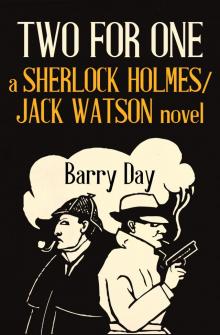 Two for One
Two for One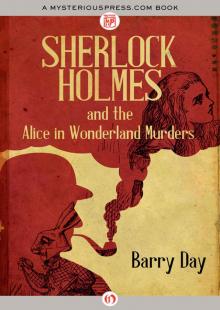 Sherlock Holmes and the Alice in Wonderland Murders
Sherlock Holmes and the Alice in Wonderland Murders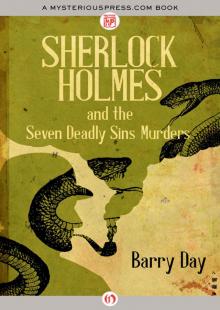 Sherlock Holmes and the Seven Deadly Sins Murders
Sherlock Holmes and the Seven Deadly Sins Murders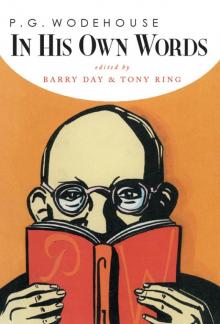 P.G. Wodehouse in his Own Words
P.G. Wodehouse in his Own Words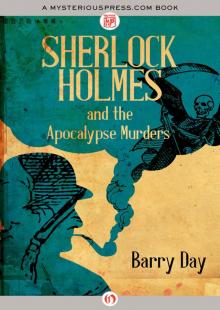 Sherlock Holmes and the Apocalypse Murders
Sherlock Holmes and the Apocalypse Murders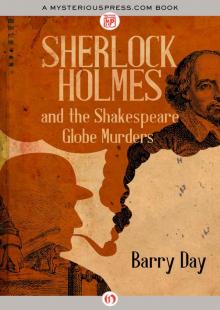 Sherlock Holmes and the Shakespeare Globe Murders
Sherlock Holmes and the Shakespeare Globe Murders